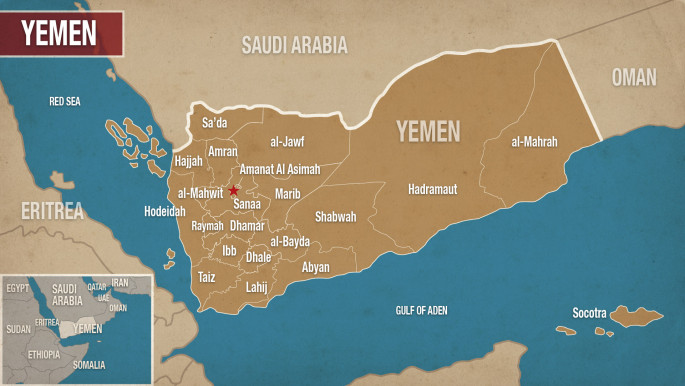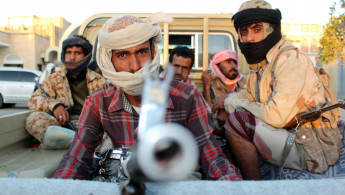Yemen's oil-rich Shabwah province faces a dangerous power struggle
As clashes have once again erupted between the Houthis and the Saudi Arabia-backed government forces in Yemen's West, tensions are quietly brewing over the geostrategic, resource-rich eastern Shabwah governorate, posing another risk to the country's peace.
Following the Southern Transitional Council's [STC] coup in the temporary government capital of Aden last August, its forces expanded and sought to forcibly capture Shabwah, leading to 'a civil war within a civil war'.
Not only did government forces manage to repel STC forces, the Saudi-brokered Riyadh agreement in November sought to unify both sides into a power-sharing administration.
Violence had broken even out in December between the STC and government aligned Islah militias, even though the Riyadh agreement had forged a ceasefire and attempted unification between the separatists and Hadi government.
Though violence has decreased since, the government still seeks to restore its claim over the governorate, while the STC seeks to include it as part of an independent southern Yemen state per pre-1990 unification lines – its long-term ambition.
Presenting itself as the successor to South Yemen, the STC and its armed wing the Security Belt and other southern militias, often led by Salafist figures, are financed and empowered by the United Arab Emirates. Though the UAE supports the Shabwani Elite Forces under the guise of counterterrorism, the faction serves to consolidate southern separatist control over the governorate.
 |
The UAE is backing these separatist militias to control the Shabwah governorate, particularly for its oil and gas fields |  |
"The UAE is backing these separatist militias to control the Shabwah governorate, particularly for its oil and gas fields, and the Balhaf area to use for gas exports," Nabil al-Boukiri, an independent Yemeni researcher, told The New Arab.
By January Hadi government forces were mostly in control of the Shabwah governorate, according to a report assessing southern Yemen's political divides by Helen Lackner and Raiman al-Hamdani.
The government oil company Safer had restarted oil exports in October, after its oil fields were reopened the previous year, showing it is establishing control over Shabwah and its resources.
 |
|
Though the UN Special Envoy to Yemen Martin Griffiths said in January that Yemen was entering an unprecedented era of peace, the STC has refused to withdraw per the terms of the Riyadh agreement, which has barely been implemented since November while missing several deadlines.
Both the government and STC have criticised each other over seeking to take control over Shabwah's hydrocarbons.
An official STC Arabic statement from January indicates that the faction seeks to control Shabwah and its resources for the long-term goal of a southern independent state, while countering its Islah opponents.
 |
Both the government and STC have criticised each other over seeking to take control over Shabwah's hydrocarbons |  |
"Since the Elite Forces failed in their initial attempts to gain control over the Shabwa governorate, they have remained in place and have continued to sow chaos against the governor and have threatened social and political stability," Adel al-Hasani, a Yemeni analyst and human rights activist, told The New Arab.
Analysts focus on how the UAE is driving the STC in order to consolidate its own control over the governorate for its geopolitical ambitions.
Read also: Tensions in Yemen's Hodeida cripple peace hopes and further impoverish civilians
Shabwa's governor Mohammad Saleh bin Adyo tweeted that "It is very unfortunate that the Emirates are financing the chaos in Shabwah," adding that Emirati finance should be spent on "providing services or helping people fulfil their needs".
"We have a deeper belief that any attempt to disrupt the security an stability of the governorate will fail and that the money paid to cause chaos and spread sedition will not work in the face of the will, determination and wisdom of the Shabwah people," added bin Adyo.
 |
|
| Read also: Yemen in Focus: Hundreds of Yemeni students stranded in 'apocalyptic' Wuhan amid coronavirus outbreak |
The STC has accused Yemen's government-aligned Islah Party of daily violations and driving Shabwah's tensions. Among alleged Islah violations include the kidnapping of a separatist leader's son in January.
However, the STC seeks to banish Islah from Shabwah. At the beginning of January it had even announced it was pulling out of the Riyadh agreement, in protest of violence in the Shabwa governorate it blamed on forces loyal to the Islah party.
The STC unequivocally opposes the Islah party, seeing it as a branch of the Muslim Brotherhood, much like its Emirati backers, therefore viewing it as a terrorist organisation. This poses obstacles for the Riyadh agreement, given Islah's alignment with the government, and the STC has not ruled out further violence.
"The military option is the last option for us, and it is among the options available to us in the event that the Muslim Brotherhood is determined not to leave Shabwah," said the STC statement in January, while also claiming that retaining an Emirati presence is vital in this supposed war on terrorism.
"The UAE is mostly driving this opposition towards Islah, as it opposes political Islam completely throughout the region. Unless the UAE, which backs the STC and Islah, manage to come to an agreement, which is currently unlikely, then this will continue to cause difficulties for peace and there could likely be further violence," added al-Boukiri.
 |
The UAE is mostly driving this opposition towards Islah, as it opposes political Islam completely throughout the region |  |
However, combating Islah is only a secondary concern for the STC. Its main stated ambition is a southern independent state, which its Emirati backers have aimed to facilitate throughout Yemen's war.
The STC and the UAE's portrayal of Islah as a terrorist faction, akin to al-Qaeda and the Islamic State group, also give a 'counterterrorism' pretext for the separatist movement to assert its control. The UAE in August directly bombed Yemeni government forces claiming it was targeting 'terrorists'.
Read also: Hundreds of UAE soldiers withdraw from deadly Yemen conflict as Sudan announces reduction in troops
Al-Hasani added that the UAE, backing the STC, seeks a coup against Shabwah's governor bin Adyo as he has criticised their provocative role in Yemen's south, and is also an obstacle to their influence.
The UAE has been involved in a similar deadlock in Yemen's island of Socotra. The governor Ramzi Mahrouz in early February had criticised a continuous increase of STC-aligned militias with UAE-backing of occupying the island in violation of the Riyadh agreement, while accusing Abu Dhabi of plotting a coup against him.
As with the rest of southern Yemen, the UAE seeks to control this geostrategic island.
Lackner and al-Hamdani argue that the STC is weaker than it claims across the south, after its military forces' control has decreased and that it denounced their former chief ally Sheikh Saleh bin Farid al-Awlaqi in the Shabwah governorate for attending a meeting in Brussels in December to solve disagreements between southern forces.
Yet while there is deep-seated hostility between the Hadi government and the UAE-backed STC, there will be future attempts to wrestle control over the resources.
"The UAE will keep using the STC to disrupt peace efforts with the government in order to control Shabwah. The problem is the Yemeni government is very weak and its decision is in Saudi Arabia's hands. Saudi Arabia is blinded to the UAE's aggressive moves on the Yemeni people and this will make it hard to counter them," Salih el-Gabri, Director of Yeni Yemen Media Center, told The New Arab.
Jonathan Fenton-Harvey is a freelance journalist. Follow him on Twitter: @jfentonharvey



